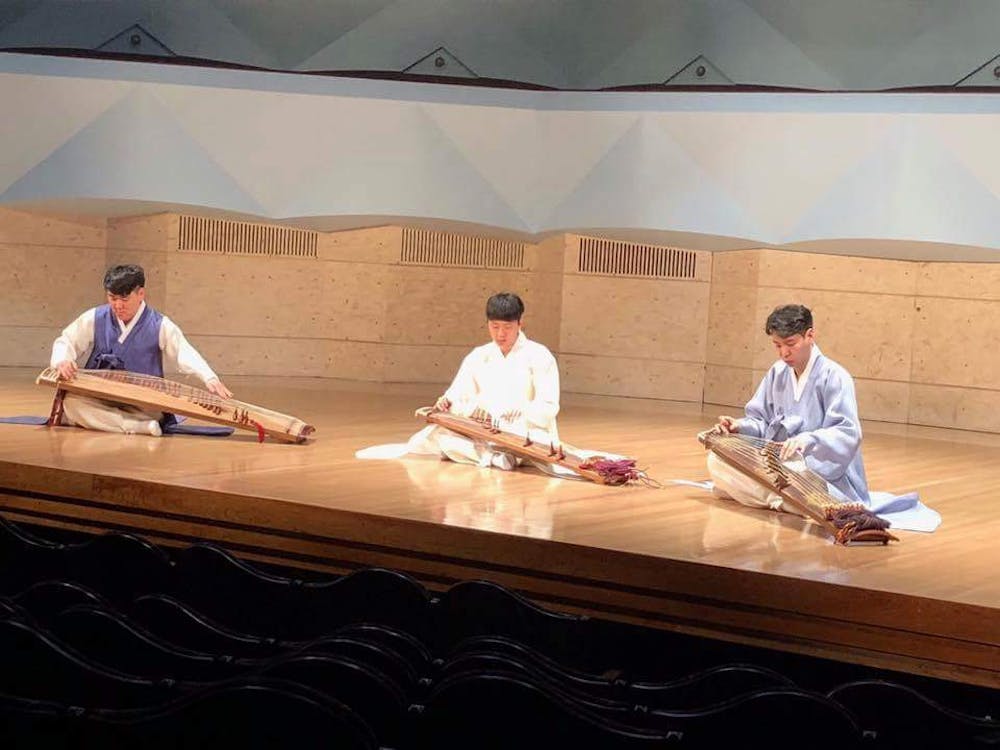Sitting in the audience section at Robison Hall on Wednesday March 1, I couldn’t help but smile at the reality of Chunhogarang performing on our campus, 6,657 miles away from Seoul, South Korea. The first Korean ensemble to play at Middlebury, Chunhogarang is an all-male gayageum ensemble. Their name is a combination of their mentor’s pen name Chunho and garang, which, in English, translates into “beautiful men.” Visiting four colleges as part of their New England Tour, the six members of Chunhogarang aimed to teach and share Korean culture and traditional music with students in the United States.
Gayageum is a traditional Korean instrument, originally composed of 12 strings but now made up of 21. With each pluck comes a beautiful and harmonious sound completely different than Western string instruments. Generally performed by women, gayageum is known as a female-focused instrument because of its graceful playing style and sound. As I listened to these men dressed in colorful, and to me, familiar, Korean traditional attire, known as hanbok, artfully share their passion and music to a predominantly non-Korean crowd, I felt proud. Proud of my culture. Proud to see my culture being shared. And proud of these men for breaking stereotypes surrounding the gayageum. One of the members, Junae Kim, noted that beyond their shared love for music, Chunhogarang came together to show the distinct beauty of men playing the gayageum as well. He was not wrong.
Throughout the performance, the ensemble presented many styles of Korean traditional music. They shifted from a trio softly playing the gayageum with grace and ease to a loud, energetic sextet composed of various traditional instruments: the gayageum, the piri (a traditional wind instrument), the janggu (a traditional drum) and the kkwaengari (a traditional brass gong). My favorites were the gayageum solo and the gayageum trio. Both performances displayed the distinct beauty Kim mentioned, being melodious and graceful yet with a sense of strength supporting the song in the background. From fast-paced to soft and steady, Chunhogarang showcased the charm and variety of Korean traditional music and successfully brought the audience to admire and, hopefully, continue to listen to this genre. When asked why they chose to pursue traditional music rather than contemporary, the members of Chunhogarang remarked that while contemporary music follows trends and fads, traditional music is constant and preserved.
“To this day, we listen to Mozart, Beethoven and Bach,” Kim remarked. And like Director Sahie Kang of the Middlebury Language School of Korean, who presented the concert, said, “this is the original k-pop.”
Standing up with the rest of the audience, I fervently applauded them for their amazing performance but also to thank them for building up a warm sensation in my heart. Having heard my grandfather play the gayageum for me a few times as a child, their performance brought a little bit of home back to me. For those short two hours, it almost felt like I was back in my grandparents’ home, sitting cross-legged by my grandfather, carefully observing his calloused fingers pluck and press the strings. During midterms, when sunny weather seemed to be something of a fantasy, home was just what I needed and they brought that to me.
So, as a Korean student who always longs for authentic, non-instant Korean food and who always tries to convince her friends to visit her in Seoul, I want to say thank you, Chunhogarang. You have not only shared with us your passion for music and Korean culture and broken any stereotypes on who typically plays the gayageum, but you also took us on a quick trip to Korea. You took me on a quick trip back home. 감사합니다 (thank you) and please come again soon.
Bringing Korean Music to Midd

Comments



